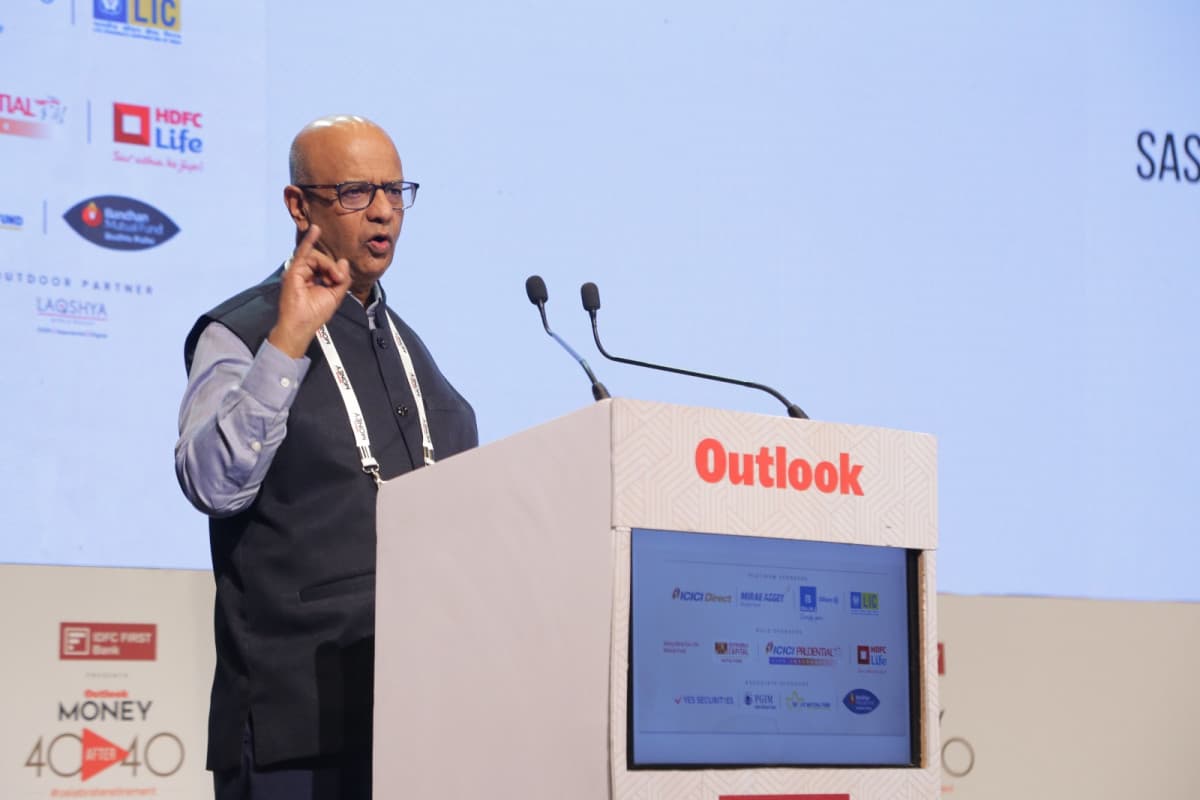40After40 Expo: Find Out Why You Don’t Save For Retirement To Help You Get Started, Says Sashi Krishnan
Some people get trapped into thinking that there is a minimum pension amount that they need to work for, which is not correct, says Krishnan.
Some people get trapped into thinking that there is a minimum pension amount that they need to work for, which is not correct, says Krishnan.

40After40 Retirement Expo Sashi Krishnan
Sashi Krishnan, chief executive officer of the National Pension System (NPS) Trust, said that people often focus on intangible things like health, vitality, etc., for retirement, which is vital, but tangible aspects are equally critical to ensure they don’t get in the way of retirement planning.
Speaking at Outlook Money’s 40After40 Retirement Expo in Mumbai on Wednesday, he stressed that before concentrating on retirement savings, one must pay attention to tendencies like instant gratification, reluctance to postpone consumption, the weakness that leads us to fall for myths and inertia to put the planning into perspective and kick it off in the right earnest. Krishnan drew attention to the tangible and intangible parts of retirement planning and, more importantly, why we don’t save for retirement. First, he said, is immediate gratification. “We can’t get away from the fact that it is so much more important than savings for retirement—what I am going to do after 60 or 70; I would rather spend the money today,” he says, drawing attention to the mindset.
Advertisement
Also Read: Retirement Expo 40After40: I Am Bihari And I Am ‘Ziddi’, Says Manoj Bajpeyee
The second is “inertia”. Krishnan says that a large number of people don’t do savings because of it. He explains inertia with an example of the motor insurance in Germany and Austria. “When you buy motor insurance in these countries, they want to know if you are willing to donate organs in case you die in a motor accident. In Germany, while filling up the form, they ask if you die in an auto accident, will you donate your organs. And if so, tick the box. And nobody ticks the box. Just about 12 per cent opted to donate their organs.
Advertisement
Also Read: The Secret Recipe To Invest In A Bull Market
“The Austrians are one up on that; they ask you differently. They ask if you die in an accident, and if you don’t want to donate your organs, tick the box below. And nobody ticks the box. Around 80 per cent of people opted in to donate organs. So sometime it’s a question of how we look at this that helps us to get over the inertia,” he says.
The third is postponing consumption. He says, “All of us think that saving for the future is sort of postponing consumption and therefore, we don’t want to put aside money for the future. If we can overcome these behavioural biases, we can take care of how to save for retirement.”
Also Read: Retirement Expo 40After40: Key Insights For Financial Wellness
Myths Affect Our Judgement
Krishnan pointed out certain myths surrounding retirement. He says retirement as a “social construct” may or may not be relevant today. For example, today, people work longer or go on to do a second inning, unlike before, when many people in government jobs would retire at 55 or 60 and expect to live for another 15 years and therefore need a pensionable income. But today, many people work or remain occupied beyond retirement.
He also drew attention to the fact that some people get trapped into thinking that there is a minimum pension they need to work for, which he disagrees. Most financial planners also face what he called “ageism”. Krishnan says, “We tend to think everyone beyond 60 is exactly the same, and want to build one single plan for everybody, it doesn’t work that way. You need to have a unique plan for everybody.”
Also Read: Mindset For Retirement More Important Than Product; Lack Of Planning A Ticking Bomb: Experts
The next big issue relevant to retirement planning is longer life expectancy. Krishnan says, “Life expectancy has increased by 26 years in the last five years. Clearly, more and more people will live longer and therefore, we are going to plan for life after retirement for next 60 years after 40.”
Regarding NPS, he says that it has a long way to go in terms of assets held and number of subscribers.
“Today, NPS manages assets of close to Rs 11 lakh crore from over seven lakh subscribers. Both these numbers in the Indian context is very low in terms of the percentage of GDP and population. Therefore, there is a very long way to go in terms of what we want to do,” he says.
Advertisement
For employees, EPF offers the most secure and attractive option for retirement planning. Self-employed individuals also have retirement planning options, but they are frequently overlooked.
This year’s theme for International Women’s Day, celebrated on March 8 every year, is ‘Invest in Women: Accelerate Progress’.
Artificial intelligence is the latest technology to help humans perform tasks which are quite routine. As technology improves, artificial intelligence can also be used for complex tasks
Get all the latest stories delivered to your inbox
Advertisement
Get all the latest stories delivered to your inbox